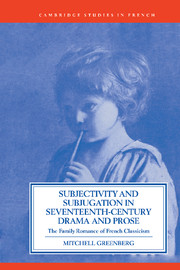 Subjectivity and Subjugation in Seventeenth-Century Drama and Prose
Subjectivity and Subjugation in Seventeenth-Century Drama and Prose Book contents
- Frontmatter
- Contents
- Preface
- Introduction
- 1 L'Astrée and androgyny
- 2 The grateful dead: Corneille's tragedy and the subject of history
- 3 Passion play: Jeanne des Anges, devils, hysteria and the incorporation of the classical subject
- 4 Rodogune: sons and lovers
- 5 Molière's Tartuffe and the scandal of insight
- 6 Racine's children
- 7 “Visions are seldom all they seem”: La Princesse de Clèves and the end of Classical illusions
- Notes
- Index
- Cambridge Studies in French
3 - Passion play: Jeanne des Anges, devils, hysteria and the incorporation of the classical subject
Published online by Cambridge University Press: 16 October 2009
- Frontmatter
- Contents
- Preface
- Introduction
- 1 L'Astrée and androgyny
- 2 The grateful dead: Corneille's tragedy and the subject of history
- 3 Passion play: Jeanne des Anges, devils, hysteria and the incorporation of the classical subject
- 4 Rodogune: sons and lovers
- 5 Molière's Tartuffe and the scandal of insight
- 6 Racine's children
- 7 “Visions are seldom all they seem”: La Princesse de Clèves and the end of Classical illusions
- Notes
- Index
- Cambridge Studies in French
Summary
For centuries, hysteria has named an incapacity to … be the difference, “the woman.” To explain hysteria by the problem of sexual identity is to miss the struggle in female hysteria against that assumption of difference, against that identity, is to refind hysteria as a nature of women and not the site of a resistance – nothing to do with an essence – in culture.
S. Heath, “Difference,” p.57The Renaissance, as we know, was obsessed with the body. It has even been said that the period that turned its back on the “Dark Ages” did so by discovering, and more importantly displaying, in painting, in sculpture and in literature, the body that, freed from its vestimentary fetters, took its place (as Ronsard put it) “net, libre et nu” as the privileged symbol of human perfectibility. This vision, an exultation, is the Utopian promise of a body that exists only for the eye to embrace, to encompass, to penetrate and to possess. At the same time, it must be said that this vision of the body, that the body exposed, caressed by the eye of the beholder, responds to a new, or at least, a newly invested desire, the desire to see. Seeing, that is, the subjective incorporation of the world, becomes a metaphor for knowing that world, the privileged mode for seizing exterior reality and making it a part of the self.
- Type
- Chapter
- Information
- Subjectivity and Subjugation in Seventeenth-Century Drama and ProseThe Family Romance of French Classicism, pp. 65 - 86Publisher: Cambridge University PressPrint publication year: 1992


